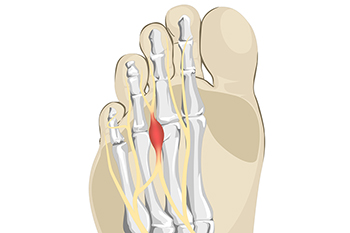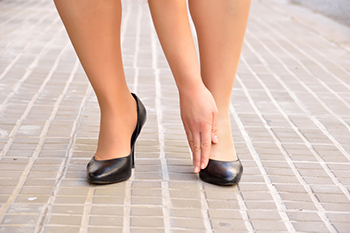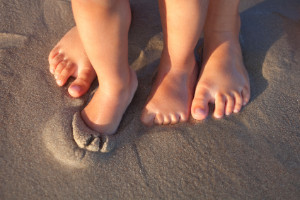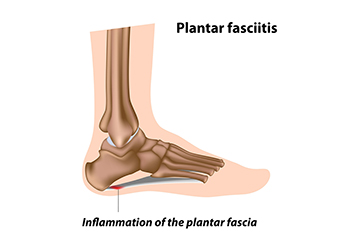June 2023
Morton’s Neuroma and Wearing High Heels

Morton’s neuroma is a foot condition that affects the nerves between the third and fourth toes. It generally happens from weaning shoes that do not have enough room for the toes to move freely in. This condition can develop in people who frequently wear high heels, and the nerve can become irritated or damaged. Common symptoms many patients experience can consist of having a burning pain in this area, and it can feel as if a small stone is in the shoe or sock. Mild relief can be found when the offending pair of shoes is not worn, and the affected foot is elevated. It is beneficial to wear wide, comfortable shoes that have a soft sole and low heel, and it may help to lose weight if needed. If there is a pain in this part of your foot, and simple relief tactics are ineffective, it is strongly suggested that you seek the counsel of a podiatrist who can effectively diagnose Morton’s neuroma, and guide you toward permanent relief methods.
Morton’s neuroma is a very uncomfortable condition to live with. If you think you have Morton’s neuroma, contact the podiatrists of New England Family Foot Care. Our doctors will attend to all of your foot care needs and answer any of your related questions.
Morton’s Neuroma
Morton's neuroma is a painful foot condition that commonly affects the areas between the second and third or third and fourth toe, although other areas of the foot are also susceptible. Morton’s neuroma is caused by an inflamed nerve in the foot that is being squeezed and aggravated by surrounding bones.
What Increases the Chances of Having Morton’s Neuroma?
- Ill-fitting high heels or shoes that add pressure to the toe or foot
- Jogging, running or any sport that involves constant impact to the foot
- Flat feet, bunions, and any other foot deformities
Morton’s neuroma is a very treatable condition. Orthotics and shoe inserts can often be used to alleviate the pain on the forefront of the feet. In more severe cases, corticosteroids can also be prescribed. In order to figure out the best treatment for your neuroma, it’s recommended to seek the care of a podiatrist who can diagnose your condition and provide different treatment options.
If you have any questions, please feel free to contact our office located in Milton, MA . We offer the newest diagnostic and treatment technologies for all your foot care needs.
Wearing High Heels May Cause Ingrown Toenails

A common foot condition that can develop from frequently wearing high heels is ingrown toenails. Despite the pain and discomfort this ailment can cause, many women continue to wear this type of shoe and choose to suffer through the pain. When these types of shoes are worn, pressure can be exerted on the toes, possibly preventing the toenails from growing properly. Additionally, this may cause the nail to puncture the skin, and an infection may ensue. Ingrown toenails may be managed when high heels must be worn by refraining from wearing tight hosiery and soaking the feet in lukewarm water. Patients who have diabetes may need to pay extra attention if they have developed an ingrown toenail. It is beneficial to temporarily stop wearing the high heels that caused the toenail to become ingrown, and an infected ingrown toenail may require minor surgery for relief. If you wear high heels and have developed an ingrown toenail, it is suggested that you confer with a podiatrist who can help you to manage this condition.
High heels have a history of causing foot and ankle problems. If you have any concerns about your feet or ankles, contact the podiatrists from New England Family Foot Care. Our doctors can provide the care you need to keep you pain-free and on your feet.
Effects of High Heels on the Feet
High heels are popular shoes among women because of their many styles and societal appeal. Despite this, high heels can still cause many health problems if worn too frequently.
Which Parts of My Body Will Be Affected by High Heels?
- Ankle Joints
- Achilles Tendon – May shorten and stiffen with prolonged wear
- Balls of the Feet
- Knees – Heels cause the knees to bend constantly, creating stress on them
- Back – They decrease the spine’s ability to absorb shock, which may lead to back pain. The vertebrae of the lower back may compress.
What Kinds of Foot Problems Can Develop from Wearing High Heels?
- Corns
- Calluses
- Hammertoe
- Bunions
- Morton’s Neuroma
- Plantar Fasciitis
How Can I Still Wear High Heels and Maintain Foot Health?
If you want to wear high heeled shoes, make sure that you are not wearing them every day, as this will help prevent long term physical problems. Try wearing thicker heels as opposed to stilettos to distribute weight more evenly across the feet. Always make sure you are wearing the proper shoes for the right occasion, such as sneakers for exercising. If you walk to work, try carrying your heels with you and changing into them once you arrive at work. Adding inserts to your heels can help cushion your feet and absorb shock. Full foot inserts or metatarsal pads are available.
If you have any questions please feel free to contact our office located in Milton, MA . We offer the newest diagnostic and treatment technologies for all your foot and ankle needs.
Facts About Children’s Feet

There are basic facts involving children’s feet that are interesting to know. The bones in children’s feet do not fully develop until the age of 13, and it is helpful to provide them with shoes that have the necessary support as they grow. This is crucial in maintaining good foot health. Many parents realize they are buying shoes at an accelerated rate during the first few years after birth. Research has shown the feet grow the fastest in the first three years. Flexible and comfortable shoes are ideal to purchase, and this can help the child to get accustomed to their growing feet. The feet house one-quarter of the bones that are in the body, and the majority of babies are born with flat feet. The arch generally develops during the teenage years, and having an abnormal foot structure may cause flat feet to lead into adulthood. If you would like more information about children’s foot health, it is suggested that you speak with a podiatrist who can provide you with the knowledge you are seeking.
Making sure that your children maintain good foot health is very important as they grow. If you have any questions, contact the podiatrists of New England Family Foot Care. Our doctors can provide the care you need to keep you pain-free and on your feet.
Keeping Children's Feet Healthy
Having healthy feet during childhood can help prevent medical problems later in life, namely in the back and legs. As children grow, their feet require different types of care. Here are some things to consider...
Although babies do not walk yet, it is still very important to take care of their feet.
Avoid putting tight shoes or socks on his or her feet.
Allow the baby to stretch and kick his or her feet to feel comfortable.
As a toddler, kids are now on the move and begin to develop differently. At this age, toddlers are getting a feel for walking, so don’t be alarmed if your toddler is unsteady or ‘walks funny’.
As your child gets older, it is important to teach them how to take care of their feet.
Show them proper hygiene to prevent infections such as fungus.
Be watchful for any pain or injury.
Have all injuries checked by a doctor as soon as possible.
Comfortable, protective shoes should always be worn, especially at play.
If you have any questions please feel free to contact our office located in Milton, MA . We offer the newest diagnostic and treatment technologies for all your foot and ankle needs.
Are You Suffering From Ingrown Toenails?
Incorrect Shoes and Walking Barefoot May Cause Plantar Fasciitis

The foot condition that is known as plantar fasciitis affects many people across the globe. It happens when the plantar fascia becomes irritated or torn from gradual overuse, or possibly from an injury. The plantar fascia is found on the sole of the foot, and connects the heel to the toes. It is responsible for walking and running, and completing daily activities can be difficult if it becomes damaged. A common cause of this foot condition is wearing shoes that do not fit correctly, which may cause heel support to be lost and uneven steps to be taken. People who walk barefoot may find the ligaments in their feet become damaged, and these are crucial in providing adequate support for the feet. If this pertains to you, it is beneficial to limit the time walking barefoot, and it can help to wear shoes with adequate cushioning in the heel area. If you have developed plantar fasciitis, it is strongly suggested that you are under the care of a podiatrist who can properly diagnose and offer correct treatment options for plantar fasciitis.
Plantar fasciitis is a common foot condition that is often caused by a strain injury. If you are experiencing heel pain or symptoms of plantar fasciitis, contact the podiatrists from New England Family Foot Care. Our doctors can provide the care you need to keep you pain-free and on your feet.
What Is Plantar Fasciitis?
Plantar fasciitis is one of the most common causes of heel pain. The plantar fascia is a ligament that connects your heel to the front of your foot. When this ligament becomes inflamed, plantar fasciitis is the result. If you have plantar fasciitis you will have a stabbing pain that usually occurs with your first steps in the morning. As the day progresses and you walk around more, this pain will start to disappear, but it will return after long periods of standing or sitting.
What Causes Plantar Fasciitis?
- Excessive running
- Having high arches in your feet
- Other foot issues such as flat feet
- Pregnancy (due to the sudden weight gain)
- Being on your feet very often
There are some risk factors that may make you more likely to develop plantar fasciitis compared to others. The condition most commonly affects adults between the ages of 40 and 60. It also tends to affect people who are obese because the extra pounds result in extra stress being placed on the plantar fascia.
Prevention
- Take good care of your feet – Wear shoes that have good arch support and heel cushioning.
- Maintain a healthy weight
- If you are a runner, alternate running with other sports that won’t cause heel pain
There are a variety of treatment options available for plantar fasciitis along with the pain that accompanies it. Additionally, physical therapy is a very important component in the treatment process. It is important that you meet with your podiatrist to determine which treatment option is best for you.
If you have any questions, please feel free to contact our office located in Milton, MA . We offer the newest diagnostic and treatment technologies for all your foot care needs.









